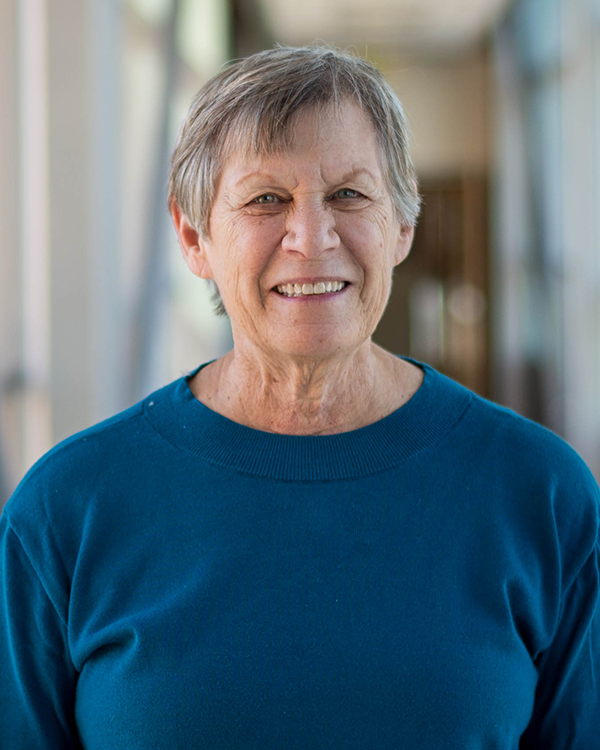Paula Hoffman, PhD
Professor Emerita

Contact Information:
University of Colorado Denver
Department of Pharmacology
Mail Stop 8303, RC1-North
12800 East 19th Ave
Aurora CO 80045
Phone: (303) 724-3628
Fax: (303) 724-3663
Email: [email protected]
Office: RC1-North, P18-6119
Affiliated Programs
My research for many years has focused on the neurobiological effects of alcohol, including neuroadaptive mechanisms that lead to tolerance and withdrawal/physical dependence. Recent work has also investigated the genetic basis of these complex alcohol-related traits as well as alcohol consumption. We have developed an integrative genomic approach to understanding the genetic predisposition to variations in these complex traits. Analysis of gene expression levels in brain and other organs of panels of inbred and recombinant inbred animals, originally using microarray technology and currently RNA-Seq, provides the basis for identification of genetically-regulated transcriptional networks that can be associated with alcohol-related phenotypes. Determination of common genetic regulation of transcriptional networks and phenotypes generates “candidate networks” that are postulated to underlie the phenotype. Validation of these networks is based on molecular biological and behavioral studies. Our research has translational relevance for understanding the basis of GWAS results in humans, and for development of novel therapeutic approaches for alcohol use disorder (AUD, alcohol dependence).

In a recent publication (Saba et al., The Sequenced Rat Brain Transcriptome – Its Use in Identifying Networks Predisposing Alcohol Consumption, FEBS J 282: 3556, 2015), we used the integrative genomic approach, involving correlation of transcriptional networks with the phenotype of alcohol consumption in a recombinant inbred rat population and in selectively bred lines of rats, and determination of coinciding quantitative trait loci for gene expression and alcohol consumption. This approach identified a gene coexpression network associated with alcohol consumption (Figure 1) that was enriched for genes associated with microglia and astrocytes, and could be categorized as related to immune function, energy metabolism and calcium homeostasis, as well as glial-neuronal communication (Figure 2). Summarizing the function of the genes in this module, we found that rats predisposed to drinking high levels of alcohol have lower innate immunity in brain, lower GABA function and higher glutamate function, and lower glucose uptake and ATP production. We have since obtained rats in which a key transcript from the module (the “hub gene”, an unannotated transcript which appears to be a long con-coding RNA) has been “knocked out”, and we verified that altering expression of this transcript results in a change in alcohol consumption. Because excessive alcohol consumption is a prerequisite for the development of alcohol use disorder, these data provide for identification of therapeutic targets to reduce the genetically-mediated predisposition to alcohol consumption, and thereby reduce the incidence of AUD.
 I am also associated with a small biotech company, Lohocla Research Corporation. The focus of Lohocla’s efforts is development of novel molecular entities to treat addiction, particularly alcohol addiction, and chronic pain. Lohocla
recently (2015) received SBIR funding from the National Institute on Alcohol Abuse and Alcoholism (NIAAA/NIH) to take a lead compound, Nezavist, to an IND. A recent publication (Tabakoff et al., A Novel Substituted Aminoquinoline Selectively Targets
Voltage-Sensitive Sodium Channel Isoforms and NMDA Receptor Subtypes and Alleviates Chronic Inflammatory and Neuropathic Pain, Eur. J. Pharmacol. 784: 1, 2016) describes another novel molecule developed by Lohocla that acts peripherally to produce
anti-hyperalgesic effects in several pre-clinical pain models (Figure 3).
I am also associated with a small biotech company, Lohocla Research Corporation. The focus of Lohocla’s efforts is development of novel molecular entities to treat addiction, particularly alcohol addiction, and chronic pain. Lohocla
recently (2015) received SBIR funding from the National Institute on Alcohol Abuse and Alcoholism (NIAAA/NIH) to take a lead compound, Nezavist, to an IND. A recent publication (Tabakoff et al., A Novel Substituted Aminoquinoline Selectively Targets
Voltage-Sensitive Sodium Channel Isoforms and NMDA Receptor Subtypes and Alleviates Chronic Inflammatory and Neuropathic Pain, Eur. J. Pharmacol. 784: 1, 2016) describes another novel molecule developed by Lohocla that acts peripherally to produce
anti-hyperalgesic effects in several pre-clinical pain models (Figure 3).
